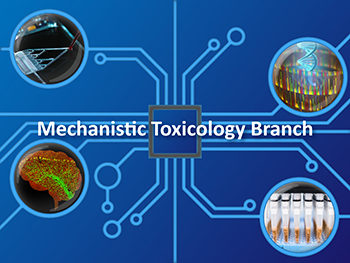
Much of the work carried out by DTT is in support of the National Toxicology Program (NTP), an interagency partnership of the Food and Drug Administration, National Institute for Occupational Safety and Health, and NIEHS.
The Mechanistic Toxicology Branch (MTB) aims to provide laboratory research support to the NIEHS Division of Translational Toxicology (DTT) and to conduct mechanistic research in toxicology. DTT is a team-based scientific organization, and its mission is to improve public health through development of data and knowledge that are translatable, predictive, and timely.

Branch scientists use their laboratory research capabilities to identify human health hazards from environmental and chemical exposures and further mechanistic understanding of environmental toxicity contributing to human disease. Such efforts, which are project-driven in collaboration with members of DTT Program Management Teams, help to advance the program mission.
MTB staff are responsible for the following functions:
- Collaborate with internal and external researchers and environmental stakeholders for program-responsive outcomes to DTT.
- Conduct bioanalytical disposition and metabolite analysis of environmental and test chemicals in experimental systems by liquid chromatography-mass spectrometry (LC-MS).
- Conduct high-content screening of toxicants in 96 and 384-well format using Opera Phenix and ImageXpress Micro confocal imaging systems.
- Develop novel in vitro systems with a variety of cell types, including hepatocytes, cardiomyocytes, embryonic and iPS cells, and renal, neural, and reproductive cells, leading to new, scalable bioassays for DTT’s testing program.
- Perform high throughput screening of test chemicals using in vitro human and animal cell models by concentration-response with automated liquid handling systems and plate readers in 96 and 384-well formats.
- Perform targeted and untargeted toxico-metabolomic analysis by LC-MS from in vitro or in vivo biofluids or cell and tissue extracts.
- Produce and deliver high-quality histochemical, biochemical, and molecular laboratory data in a timely manner.
- Provide laboratory experts in a range of in vitro bioassays and in vivo testing methods to participate in study design for test article exposures in DTT hazard assessment.
- Provide on-site, program-responsive, laboratory support to DTT Program Management Teams for screening, prioritization, and mechanistic understanding of chemical effects and environmental factors related to human exposure and health.
MTB scientists contribute to NTP report and monograph series and publish findings in the NIEHS report series and peer-reviewed scientific literature. Staff publications can be viewed on the webpage.
Acting Chief

Darlene Dixon, D.V.M., Ph.D., D.A.C.V.P.
[email protected]


